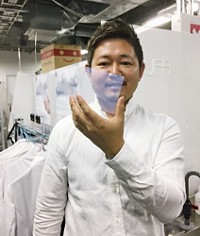Advertisement
Grab your lab coat. Let's get started
Welcome!
Welcome!
Create an account below to get 6 C&EN articles per month, receive newsletters and more - all free.
It seems this is your first time logging in online. Please enter the following information to continue.
As an ACS member you automatically get access to this site. All we need is few more details to create your reading experience.
Not you? Sign in with a different account.
Not you? Sign in with a different account.
ERROR 1
ERROR 1
ERROR 2
ERROR 2
ERROR 2
ERROR 2
ERROR 2
Password and Confirm password must match.
If you have an ACS member number, please enter it here so we can link this account to your membership. (optional)
ERROR 2
ACS values your privacy. By submitting your information, you are gaining access to C&EN and subscribing to our weekly newsletter. We use the information you provide to make your reading experience better, and we will never sell your data to third party members.
Start-ups
In Japan, start-up culture is starting to emerge
Long given short shrift, young chemistry-related companies are winning government and business attention
by Katsumori Matsuoka, special to C&EN
August 15, 2022
| A version of this story appeared in
Volume 100, Issue 28

In parts of Japan that aren’t connected to a pipeline network, propane is delivered in cylinders that can weigh over 60 kg. The weight of those cylinders might drop to just 10 kg thanks to a new material being developed by Atomis, a start-up that emerged from Kyoto University.
For years, start-up activity in Japan was moribund. But now, companies like Atomis are sprouting in the chemical, material, and pharmaceutical sectors. The emergence of innovative companies in the country is fueled by a sharp increase in the availability of seed capital and by government measures to encourage start-ups. But Japan continues to lag the US in start-up investment, and business leaders don’t see that changing soon.
Both the government and major business groups have expressed concern that Japan is losing its economic vitality. In 1989, when the Tokyo stock market hit an all-time high, 7 of the world’s 10 largest companies by market capitalization were from Japan. Today, no Japanese name is to be found at the top. And unlike in the US, where several of the largest companies—think Tesla and Meta (formerly Facebook)—are relatively young, mature incumbents like Mitsubishi and Toyota rule in the Land of the Rising Sun.
Keidanren (Japan Business Federation), Japan’s top business organization, noted in a March report that “Japan has extremely few companies that have achieved dramatic growth in a short period of time compared to Europe, the US, and China, and this is a challenge for strengthening the competitiveness of the Japanese economy.”
The business group suggested creating a government “start-up agency” that would manage all relevant policies. It also proposed that institutional investors like the Government Pension Investment Fund put some of their cash in start-ups. With appropriate support, Keidanren said, the number of start-ups in Japan could reach 100,000 by 2027, 10 times its current number. The group also proposed a target of 100 “unicorns,” start-ups with a market value of over $1 billion, by 2027, also 10 times the current number.
Changes are happening. In June, Japan’s Ministry of Economy, Trade, and Industry issued a booklet listing 69 new measures to encourage start-ups. These include a loan program and several tax credits for both start-ups and investors.
Young people see working for start-ups as an attractive career choice. A recent survey of graduating students at two elite universities, Kyoto University and the University of Tokyo, showed that half of students had applied for positions at start-ups. Many applied as part of a scatter-shot job application approach, but 20% said that they were specifically attracted to joining a start-up.
Funding is also becoming more abundant. The Japan Venture Capital Association estimates that start-up investment reached nearly $6 billion in 2021. This is a tiny fraction of the $311 billion that US start-ups raised last year but still a 60% increase over the amount raised in Japan in 2018.
Naonori Kurokawa, a partner at the University of Tokyo Edge Capital Partners (UTEC), which invests in business offshoots from universities, says his company has been able to attract more capital from investors. For its fifth investment fund, UTEC recently raised $220 million, four times what its first fund raised in 2004.
Artificial intelligence, the Internet of Things, financial technology, and space are the most popular sectors for Japanese start-ups. But chemicals and biotech are also prominent. In fact, Kurokawa says, more and more chemical and biotech start-ups are emerging because others have found success in recent years. UTEC recently facilitated an initial public stock offering for PeptiDream, a pharmaceutical peptide developer. Microwave Chemical, which uses microwaves in chemical synthesis, aims to follow.
Atomis developed its innovative material, a metal-organic framework (MOF), on the basis of research by Susumu Kitagawa, a professor of engineering at Kyoto University’s Institute for Advanced Study. The firm says its MOFs have porosity that can be adjusted at the nanometer level and harnessed for functions such as adsorption, separation, storage, catalysis, and electron transmission.
The gas cylinders that incorporate Atomis’s MOFs are branded as CubiTan. They can be used for conventional propane delivery, CEO Daisuke Asari says, and to store methane that is captured from sewage sludge, food waste, and livestock. Methane is a potent greenhouse gas, and burning such methane as fuel rather than letting it dissipate into the atmosphere offers huge carbon savings, Asari says.
It’s not unusual for Japanese start-ups like Atomis to be based on basic-research breakthroughs, says Kurokawa, the UTEC partner. Japanese basic research is first class, he notes, as evidenced by the number of scientists from Japan who have won Nobel Prizes. “Japanese scientific breakthroughs have resulted in the creation of new industries in sectors such as lithium-ion batteries, LEDs [light-emitting diodes], asymmetric synthesis, and conductive polymers,” Kurokawa says.

Six-year-old Intelligent Surfaces is another start-up that was launched to commercialize basic research. The firm, with roots in the Tokyo Institute of Technology and the University of Tokyo, is developing applications for 2-methacryloyloxyethyl phosphorylcholine (MPC) polymer, a biomimetic material intended to impart antifogging and antifouling properties to medical devices such as endoscopes, laparoscopes, and catheters. “We are creating a paradigm shift” in the field of medical devices, CEO Yoshihiro Kiritoshi says.
Intelligent Surfaces’ first product is called Clear Stay. Jointly developed with Neuroceuticals, a distributor of medical devices, it is a coating for endoscope lenses. The product has been warmly welcomed by the endoscope community both in Japan and abroad, Kiritoshi says.
The company’s next product, Endo-0-Clear, is a coating designed to facilitate laparoscopic surgery, which involves an electric scalpel fitted with an endoscope. The scalpel’s actions can create vapor and particles that foul the endoscope’s lens. “Surgeons need to take out the laparoscope during surgery and clean it repeatedly,” Kiritoshi says.
Intelligent Surfaces next plans to apply MPC polymer to catheter tubes. Kiritoshi says the coating will prevent clogging in the tubes and may allow surgical patients with catheters to stop taking anticoagulant drugs such as heparin. “It is expected to eliminate the use of such chemicals, which would be a paradigm shift in medical treatment,” he says.
Japanese start-ups aren’t only coming out of universities. Michio Ishikawa founded the thin-film specialist Tsubasa Science in 2019 after years as a research executive at Ulvac, a Japanese deposition technology firm. Tsubasa’s main business is in semiconductor films, but Ishikawa aspires to replace plastic containers with environmentally friendlier ones made of paper coated with a thin layer of glass.
In Japan, the government provides incentives to firms that reduce plastic pollution by replacing plastics with other materials. So far, only some replacement containers are made of paper. The main example is milk containers, which are coated with polyethylene on both sides.
Instead, Tsubasa sprays a silane-based solution onto the paper’s surface to create a thin, inert, glass-like coating. The technology is derived from a process for forming a diamond-like film during semiconductor manufacturing. With the paper coating, Tsubasa is looking at a market worth nearly $40 billion per year in Japan alone, Ishikawa says.
The company intends to commercialize the process by first focusing on “high-value-added products with complicated forms, such as luxury lunch boxes and confectionery containers,” Ishikawa says. As costs decrease, the company will target other markets.
Ishikawa is confident in the utility of his paper-coating technology, but to commercialize it, he needs a demonstration device that will cost hundreds of thousands of dollars to build. Venture capital firms and banks are too conservative with their money, he says, so he intends to use crowdsourcing to raise the cash.
Likewise, Atomis’s Asari isn’t counting on venture capital firms (VCs) for his funding. “There are not many VCs who understand materials-related ventures,” he says. Atomis did raise close to $10 million from investors last year, but they were mostly industrial companies. Asari plans to fund CubiTan development in part with cash it brings in from partner companies seeking to develop MOFs for applications such as separation, catalysis, and polymer synthesis.
And Kiritoshi says Intelligent Surfaces has succeeded to date only with the help of other industrial companies such as Dexerials, a maker of electronic materials, and Tochigi Seiko, a manufacturer of medical devices. Yes, venture capital for start-ups in Japan is increasing, but the scale is still small, he says. “It will take time to create an ecosystem like that of Silicon Valley.”
Katsumori Matsuoka is a freelance writer based in Japan.




Join the conversation
Contact the reporter
Submit a Letter to the Editor for publication
Engage with us on Twitter